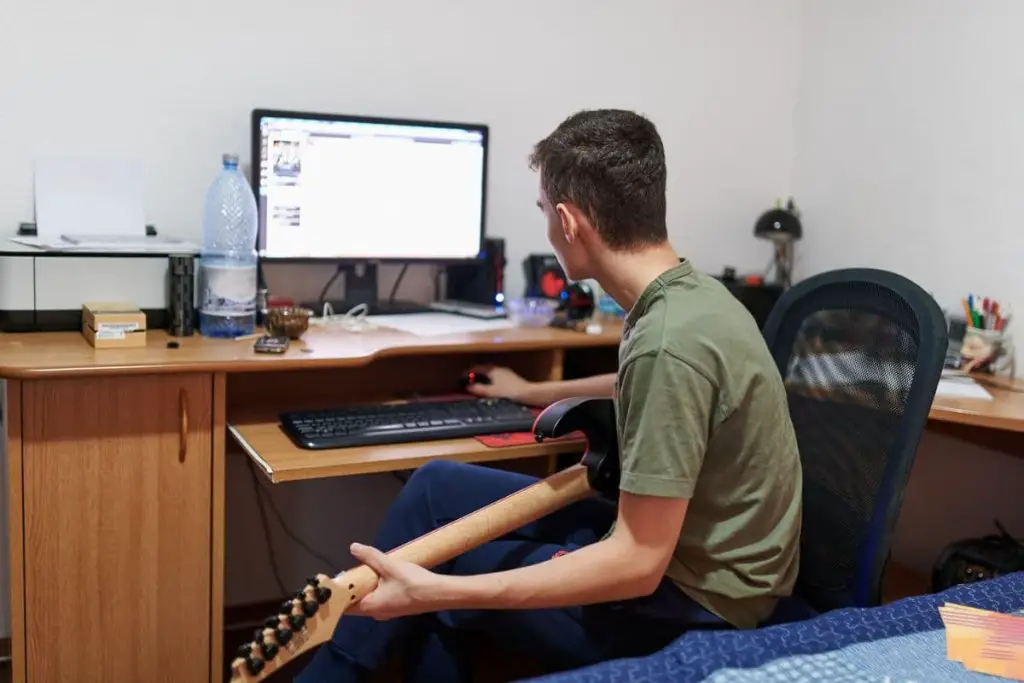The electric guitar is still one of the most popular instruments among musicians and learners. It draws many new players every year, and having some guitar skills can earn you respect even from people who are not that much into guitar music. You might be one of the people on the fence between not learning guitar and plunging into the learning process, so you’re trying to weigh the options and see if it’s worth it.
Learning electric guitar is worth it if you set reasonable expectations and invest enough time and effort. It’s a great way to unwind and meet new people. If you’re lucky, it may become a source of income. If you’re impatient and tend to get frustrated with a lack of success, it may not be worth it.
In this article, I’ll explain why learning electric guitar is a great choice if you’re looking for a fun new activity that can challenge you and keep you busy while providing you with lots of fun. I’ll also go through some reasons why it might not be a good idea for some, so you can make an informed decision.
Is Learning Electric Guitar Worth It?
Whether or not learning electric guitar is worth it depends on your individual interests and goals. Here are some things to consider:
- Do you enjoy listening to electric guitar music? If you love the sound of electric guitar and have always dreamed of being able to play it, then it may be worth pursuing.
- What are your goals with the guitar? Are you looking to play in a band, or just as a hobby? Do you want to write your own songs, or just play covers? Answering these questions can help you determine how much time and effort you want to invest in learning the instrument.
- How much time and effort are you willing to put in? Learning any instrument requires practice and dedication. If you’re willing to commit the time and effort needed to learn electric guitar, then it may be worth it.
- What is your budget? Electric guitars and related equipment can be expensive, so you’ll need to consider whether or not you’re willing and able to invest the necessary funds.
Overall, if you have a passion for music and the desire to learn electric guitar, then it can be worth it and be a rewarding and fulfilling experience. It may take time and effort to get there, but with dedication and practice, you can become a skilled player.
If you want to find out what my recommended guitar gear is, then here is what I recommend on Amazon:
- Fender Cutaway Acoustic-Electric Guitar Bundle (MY FAVORITE GUITAR)
- Snark SN-8 Super Tight All Instrument Tuner (Easiest Tuner I’ve Used)
- 6 String Acoustic Guitar Capo (Best CAPO for quick changes)
- Dunlop Max Grip 1.0mm Nylon Picks (Thick Guitar Pick So You Don’t Lose Grip!)
- Universal Guitar Stand (Cheap & Minimalist Guitar Stand I Recommend)
- Levy’s 2″ Wide Quick Adjust Guitar Strap (Best Guitar Strap For Any Level)

Think About Your Goals and Expectations When Determining Whether or Not To Learn Electric Guitar
It can be very hard to give a definitive answer to whether something is worth doing or not. What I think is worth doing might be a complete waste of time for you, and vice versa. That’s why the only way to figure out if something is worth doing or not is by assessing your goals and seeing if the activity you’re thinking about leads you to your goals.
The same goes for learning electric guitar or any other instrument for that matter. If you set unrealistic expectations for yourself, then it surely won’t be worth it. But if you are more reasonable with your goals, you might have an amazing journey ahead of you.
Let’s see what you might and should expect from learning how to play electric guitar.
Prepare To Learn and Work Hard
Even the simplest instruments, such as the triangle, require time and effort until you learn how to play them. Some instruments require more of this, some less. However, there is probably not a single instrument you can just pick up and start playing well immediately.
There will always be freakishly talented people who can just take an instrument and nail it right away. Most of us are not those people. Most of us have to practice hard until we get to a level where we can play confidently and pick up new songs with ease.
Many expect to progress very quickly when they pick up an instrument, get bogged down, lose their passion for playing, and give up altogether. You can’t expect that you’ll be good right away.
If you’re the type of person who gives up easily and gets discouraged if they’re not good at something immediately, then learning electric guitar might not be worth it. You’ll spend hundreds of dollars on equipment only to let it gather dust a few months later.
On the other hand, if you’re ready to accept the grind and practice regularly, it’s definitely worth it. You have to enjoy the learning process and accept that you’ll progress slowly. Therefore, if you enjoy learning new skills and your curiosity can be sparked this way, you’ll enjoy learning electric guitar.
This is not to say that the electric guitar is an excruciatingly difficult instrument. You’ll most likely be able to play some simple songs after a few months. However, you might not get anywhere without practicing regularly and making an effort, and the financial investment won’t be worth it.

Think About What You Want To Achieve
Sometimes, people learn steadily and progressively improve over time, but they quit playing after a while because their expectations are not met. This usually happens because they set expectations that are too high. Therefore, you must have reasonable expectations if you want your guitar learning to be enjoyable.
Let’s face it, the music business is tough. Many artists are fighting for recognition and their place under the sun, and only a few make it. An average person just starting out probably doesn’t have very high chances of breaking through and becoming the next big thing.
So, if you’re dreaming of becoming the next Yngwie Malmsteen and playing in arenas in front of thousands of adoring fans, I’ve got bad news for you. If your electric guitar learning is motivated mainly by dreams of success and fame, you’ll probably get disappointed and give up quickly.
The best way to approach guitar learning is by doing it for yourself. If you’re willing to learn an instrument for fun and the pleasure of learning and playing, you’ll probably stick to it and improve over time.
While you’re not very likely to become the next best thing, playing guitar will get you new friends and grant you hours of well-spent time practicing and jamming. Most hobbies lead to meeting new people, which is even more pronounced when it comes to instruments.
You will be drawn to other people for tips, lessons, and jam sessions. Usually, learning how to play electric guitar leads to wanting to form a band. Even if you don’t become big, you’ll get hours of quality time during jam sessions and rehearsals and probably form some firm friendships.
If you’re lucky enough, you might even get some gigs at the local bars, which might even become an additional source of income. Don’t let it get to your head, though. You’ll probably still need a day job, but earning some cash while doing something you love is always enjoyable.
Setting realistic expectations will help you stay on track. Reasonable goals are much easier to achieve, and that sweet feeling of achievement will make you want more. On the other hand, if your expectations are too high, you’ll probably fail and get frustrated, which won’t help you to keep learning.
Accept Plateaus and Difficulties
Learning a new skill is never a constant upward motion. There are always ups and downs. Sometimes, you might progress quickly, and sometimes you can regress and almost return to where you started. In other cases, you might hit a plateau and get into a situation where you don’t make any progress, but you also don’t regress.
It’s important to accept this as a simple fact of life. You might go through a long period in which you can’t play for months because of work, school, or other obligations. When you return to your guitar, you’ll be rusty, which can be disappointing and frustrating, especially if you were making good progress.
Some guitarists get discouraged at this stage and quit for good or go on an even longer hiatus. It’s important not to go down this path. Not being able to simply pick up where you left off is normal. It might take a while to get back to where you were, but you’ll get back there.
The same thing is true when you hit a plateau. If you’re really hooked on making progress and constantly learning new skills, it is usually frustrating when you can’t keep doing that. However, getting to this stage is normal, and it’s possible to get out of it. There are a few things you can do.
- Get guitar lessons: While one of the biggest advantages of learning guitar is being able to learn on your own, sometimes a lesson or two might be necessary. Having someone to show you how to do things will give you a fresh perspective and might push you forward.
- Get help from a friend: If lessons are not an option, you can ask a friend for help, especially if you know someone who’s more skilled than you. They might show you a different way to look at things, which can be a game-changer.
- Accept the situation: This might be more difficult for some than for others. But to be real, there’s no need to beat your head against the wall if you stop making progress. You can have plenty of fun with the skills you already have and you can explore new ways to use them.
Setting clear goals and adjusting your expectations is the first part of your journey. If you can set reasonable expectations and stick to them, you’re a good candidate for a novice guitarist. Now, we can look at what you can expect from guitar playing in terms of pros and cons.
The Pros of Learning and Playing Electric Guitar: Is it Worth it?
We’ve briefly touched on some pros of learning and playing electric guitar, but it’s worth examining them in detail. If you’re still uncertain whether or not you should pick up this instrument, its pros might attract you.

Here are some great advantages of learning electric guitar:
- It’s stress-relief
- It boosts your confidence
- It sharpens your memory
- It helps you express yourself
- It can help you socialize
Let’s examine these in more detail to see how playing guitar can help you in life.
Playing Guitar Relieves Stress
Sitting down to practice after a hard, stressful day can be a good way to alleviate stress. Focusing on your playing and learning new techniques can be a great way to get your mind off the day’s troubles. Playing music can also calm you down and help you unwind. Considering how much stress negatively impacts our health, it’s not a stretch to say that playing guitar may make you healthier.
Playing Guitar Boosts Your Confidence
Getting good at something will always make you feel more confident, and playing guitar is no exception to this. Considering how much a great shredding solo can leave the audience in awe, it might boost your confidence more than most other activities.
If you play live shows, this effect can even be heightened. Having an audience that cheers for you and follows your every move is undoubtedly a great booster of confidence. Plus, if you suffer from stage fright, getting out there and playing will help you get rid of it. Eliminating such worries gives you an additional boost of confidence.
Playing Music Sharpens Your Memory
According to this study on musicians’ memory processing, it seems that musicians have a better memory. This includes both long-term memory and working memory. While the study looks at musicians in general, not just guitarists, it’s safe to assume that the memory benefits also include guitarists.
Playing Guitar Helps You Express Yourself
Creating an original piece of music should be an authentic expression of your thoughts and feelings. Some people might express themselves better in writing, while for you, music might cut it better. If something lies heavy on your heart, you might help yourself by writing and playing a solo or a heavy riff, thus communicating your emotions to other people.
Playing Guitar Can Help You Socialize
We’ve already mentioned that playing guitar will push you to find other people to play with, thus helping you make friends. However, that’s not the only way you can meet new people as a guitarist. You’ll probably hang around on guitar forums and Facebook groups, where you’ll discuss different topics and possibly get to know someone.

Playing guitar can also be a good conversation topic. It might make you seem more interesting, and people can ask you questions about it, which will prompt conversations and push you toward meeting someone new.
However, we have to mention that playing guitar probably won’t attract potential partners. That happens very rarely. But meeting new friends is just as fine, and you’ll probably have lots of fun thanks to your guitar.
The Cons of Learning Electric Guitar: Is it Worth it?
The previous section painted a very positive picture of guitar playing. However, to get a balanced view, we also have to look at the negative sides. There aren’t that many, but I have to mention them.
Here are some downsides of playing guitar:
- It’s expensive
- It takes time
- It can hurt
Let’s examine these cons more closely to see why playing guitar can sometimes be difficult.
Playing Guitar Can Get Expensive
You can start with almost no money if you’re lucky enough to find cheap second-hand equipment. However, this is unsustainable if your goal is to get better and have a better sound. As your guitar skills progress, you will want to buy better gear that matches your skillset.
The more you learn, the more equipment you’ll need. You’ll want to experiment with different pedals, you’ll want better guitars, and you’ll need better amps to match them. Having one guitar and one amp probably won’t be enough after some time.
All this costs a lot of money and can strain your budget. This can be a problem if you have a spouse that doesn’t understand or support your endeavors or if you already have financial problems.
It’s important not to turn your guitar passion into an obsession. Don’t hoard gear, and buy only what’s necessary. Otherwise, your new hobby might make you bankrupt.
Learning Guitar Takes Time
It takes a few months to learn how to play simple songs confidently, and it can take years to truly master the instrument. In a way, you never stop learning but keep adding to the knowledge you already have.
The time it takes to learn guitar often deters people. Many don’t have that much patience and want to get good immediately. If this is you, learning guitar (or any other instrument) might not be the right thing for you.
In addition to that, you have to dedicate several hours a week to practice. Ideally, this should be every day, so you can make sure your guitar skills stay sharp. It can be hard to squeeze practicing into your daily schedule, particularly if you’re already busy.
You’ll also sometimes have to skip hanging out with friends because you have to practice. This can lead to problems if your friends don’t get what it takes to become good at your instrument. You’ll need to work on balancing your other aspects of life so you can make time for everything.

Learning Guitar Can Physically Hurt
When you first start learning, your fingers and hands will be sore, especially for the first few days. The skin on your fingertips will also be damaged, and it will stay a bit rough as long as you play. There is no way to get around this.
As you progress, you’ll stop feeling sore, but if you take a break from playing and then jump back into it, you might experience some pain again. This can also happen if you strain yourself more than usual during a practice session.
If you play too fast, you can even develop carpal tunnel syndrome. However, this usually happens to guitarists who play extreme metal genres such as thrash or black metal. You are probably not in this group, but you might feel some discomfort in your strumming hand nevertheless, so be ready for that.
Final Thoughts
If you can accept the challenges of learning electric guitar and enjoy the learning process, learning guitar will be worth it because of the fun and relaxation you’ll get. If you’re impatient and want to become a guitar god overnight, you probably won’t enjoy it and it won’t be worth it.
Learning Electric Guitar: Is it Worth It? FAQ
Here are some common questions.
Is it good to learn on an electric guitar?
Learning on an electric guitar can be a good choice for some people, depending on their interests and goals. Electric guitars tend to have thinner strings and lower action, making them easier to play and fret for beginners who are still developing strength and dexterity in their fingers. They can also be more versatile in terms of the range of sounds and genres they can be used for, compared to acoustic guitars which are typically associated with folk and country music.
That being said, it ultimately depends on personal preference and what kind of music you want to play. If you’re interested in playing acoustic genres such as folk or bluegrass, an acoustic guitar may be a better fit. Additionally, some people may find the additional gear required for electric guitar playing (such as an amplifier and effects pedals) to be a deterrent.
In the end, the most important thing is to choose the instrument that excites you and motivates you to keep playing and improving.
Is it OK to learn electric guitar first?
Yes, it’s perfectly ok to learn electric guitar first. In fact, many beginner guitarists choose to start with an electric guitar because it tends to be easier to play than an acoustic guitar, especially when it comes to pressing down the strings and fretting notes. Electric guitars also have thinner necks and lower action (the distance between the strings and the fretboard), which can make them more comfortable to play for beginners.
Additionally, learning on an electric guitar can be more motivating for some people, as it allows you to play a wider range of music styles, experiment with different sounds and effects, and play with a band or in a live setting more easily.
That being said, it’s important to note that the basic principles of playing guitar are the same whether you’re playing electric or acoustic, so if you decide to switch to an acoustic guitar later on, the skills you’ve developed on electric guitar will still be relevant. Ultimately, the best type of guitar to learn on is the one that inspires you and makes you want to keep practicing and improving.
Is it better to learn acoustic guitar or electric guitar?
There is no definitive answer to whether it’s better to learn acoustic or electric guitar, as both have their unique features and advantages.
Acoustic guitars tend to be more portable and require no additional equipment, making them an excellent choice for beginners who want to practice playing anywhere. They also tend to have thicker and wider necks, which can help build strength and dexterity in your fingers.
On the other hand, electric guitars can be more versatile and offer a wider range of sound and effects options. They also tend to have thinner and narrower necks, which can make them easier to play for some people.
Ultimately, the choice between acoustic and electric guitar comes down to personal preference and the type of music you want to play. If you’re interested in playing acoustic styles such as folk or country, an acoustic guitar might be a better choice. If you’re interested in playing rock, blues, or metal, an electric guitar might be more suitable.
It’s worth noting that many guitarists eventually end up playing both acoustic and electric guitars, as they each offer unique playing experiences and can complement each other in different ways.
How long does it take to fully learn electric guitar?
The amount of time it takes to fully learn electric guitar depends on a variety of factors, including how much time and effort you put into practice, your natural musical ability, and your specific goals as a guitarist.
Some people may be able to play simple songs after just a few weeks or months of practice, while others may take years to become highly skilled musicians. However, most people can learn to play basic chords, scales, and songs within a few months of dedicated practice.
To become a highly proficient and skilled electric guitarist, it can take several years of consistent and focused practice. It’s important to remember that learning an instrument is a lifelong pursuit and that there is always room for improvement and growth.
What is the best age to learn electric guitar?
There is no specific “best” age to learn electric guitar. People of all ages can learn to play and enjoy electric guitar. Some children start learning as young as 5 or 6 years old, while others may not start until they are adults.
However, it is important to keep in mind that children may require more time and patience when learning the guitar, as their hand and finger dexterity may not be fully developed yet. Adults may have an easier time learning because they are typically more focused and have more developed motor skills.
Ultimately, the best age to learn electric guitar is whenever someone is interested and motivated to do so. With practice and dedication, anyone can learn to play the electric guitar regardless of their age.
If you want to find out what my recommended guitar gear is, then here is what I recommend on Amazon:
- Fender Cutaway Acoustic-Electric Guitar Bundle (MY FAVORITE GUITAR)
- Snark SN-8 Super Tight All Instrument Tuner (Easiest Tuner I’ve Used)
- 6 String Acoustic Guitar Capo (Best CAPO for quick changes)
- Dunlop Max Grip 1.0mm Nylon Picks (Thick Guitar Pick So You Don’t Lose Grip!)
- Universal Guitar Stand (Cheap & Minimalist Guitar Stand I Recommend)
- Levy’s 2″ Wide Quick Adjust Guitar Strap (Best Guitar Strap For Any Level)
Recommended Posts:
- Electric Guitar Not Working When Plugged In? 5 Fixes
- How To Put an Electric Guitar Back Together (7 Steps to Assemble Electric Guitar)
- How To Put Binding on an Electric Guitar
- How To Tune Your Electric Guitar Without an Amp
- How To Install a Whammy Bar on Your Electric Guitar
- How To Make an Electric Guitar Sound Better for Metal
- 10 Ways to Make Your Electric Guitar Louder
- How to Practice Electric Guitar in an Apartment
- What To Do When Your Electric Guitar Sounds Muffled
- Why Do Acoustic Electric Guitars Need Batteries?
- 15 Best Guitar Cases (Acoustic, Electric, Classical)
- Happy Birthday Guitar Chords and Melody (Learn How To Play Easy)
- Are You Too Old to Learn Guitar? Never! (Learning As An Adult)
- Acoustic vs Electric Guitar: Should I Learn Acoustic or Electric Guitar First?
- How To Learn Guitar by Yourself (Self-Taught with Resources)
- Best Electric Guitars

